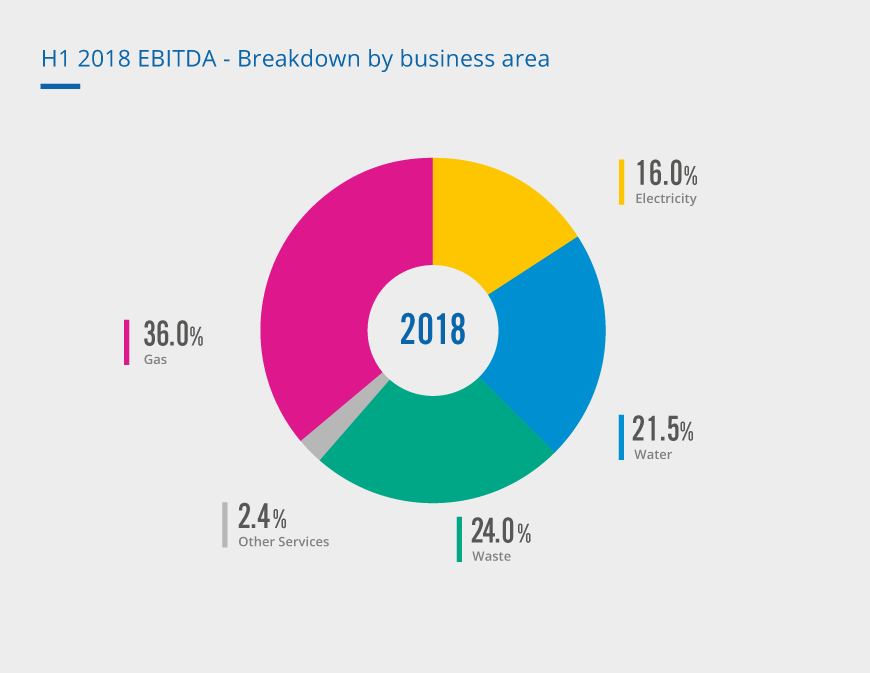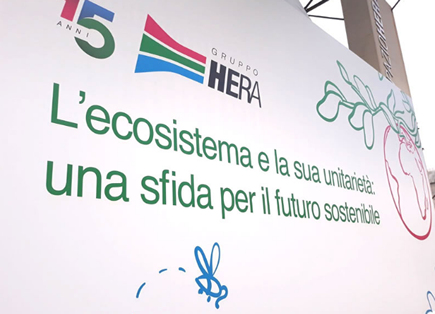| H1 2018 (data in mn€) |
REVENUES 2,966.7 (+7.7%) |
EBITDA 523,6 (+3.5%) |
EBIT 273.6 (+4.3%) |
NET INVESTMENTS 177.8 (+17.1%) |
NET FINANCIAL DEBT 2,625.0 (+4.0% vs. 2017YE) |
Three factors have mainly driven the increase of 212.7 mn€ in Group Revenues (+7.7% vs. H1 2017): i) increased Trading (57 mn€), ii) higher sales of gas and electricity (120 mn€) that reflect higher volumes sold, iii) system charges and volumes distributed growing by 52 mn€.
At the level of consolidated EBITDA, Hera recorded a 17.7 mn€ increase (+3.5%), resulting from the positive contribution of most business areas. In the Gas area the performance was particularly strong, with an EBITDA increase of 16.6 mn€ that reflects good trading margins and the 26.6% growth in volumes sold. Also the Waste area provided a positive contribution (+4.6 mn€), thanks to increasing volumes in market waste (+3.6%) and to higher liberalised prices in special waste: these factors offset lower revenues from electricity production and the end of urban waste management contracts in 13 towns located in the Forlì province. In the Water area, the increase of 1.5 mn€ of EBITDA was mainly due to higher revenues from aqueduct. The Electricity area showed a 7.6 mn€ decrease at EBITDA level, as a result of the application of IFRS principle 15 for non-disconnectable clients (-8.0 mn€) and due to the maintenance activity on the power plant in Teverola. Anyway, the customer base recorded strong expansion (+8.9%), reaching 1 million users. An achievement made possible by the growth both in the safeguarded service and in the liberalised business, as a result of an effective commercial activity, mainly focused in Central Italy.

| EBITDA (mn€) | H1 2018 | H1 2017 | Change |
| Waste | 125.9 | 121.3 | +3.8% |
| Water | 112.8 | 111.3 | +1.3% |
| Gas | 188.4 | 171.8 | +9.6% |
| Electricity | 84 | 91.6 | +8.3% |
| Other services | 12.6 | 9.9 | +27.3% |
| TOTAL | 523.6 | 505.9 | +3.5% |
Group EBIT increases by 4.3%, at a slightly higher rate than that of EBITDA (+3.5%). Depreciation rises, driven by capital expenditure, while Provisions to the Loan Loss Fund decrease, leading to an overall absorption of 250.0 mn€ (+2.6%).
The area of financial management shows a 6.7 mn€ decrease in net financial expenses compared to H1 2017 (-14.6%), thanks to debt cost efficiencies and interest proceeds for payments in arrears from safeguard customers.
In the fiscal management area, tax rate improved to 30.1% in H1 2018 from 31.6% of H1 2017, as a result of the continuous effort for fiscal optimisation allowed by the legislation in force, mainly represented by benefits brought about by super depreciation, tax credit for R&D and patent box.
Net Profit post Minorities achieves a sizeable increase (+12.1%), reaching 158.1 mn€.
NEW PERSPECTIVES OF HERA SUSTAINABILITY IN A DIALOGUE WITH STAKEHOLDERS
 On June 4th 2018, at Hera Headquarters in Bologna over 200 people attended the presentation of the Company’s 2017 Sustainability Report. The event focused on “The ecosystem and its unity: a challenge for the sustainable future” and was part of the European Week for Sustainable Development. The event went far beyond the presentation of results achieved to date, as it was rather an opportunity to think and outline future development.
On June 4th 2018, at Hera Headquarters in Bologna over 200 people attended the presentation of the Company’s 2017 Sustainability Report. The event focused on “The ecosystem and its unity: a challenge for the sustainable future” and was part of the European Week for Sustainable Development. The event went far beyond the presentation of results achieved to date, as it was rather an opportunity to think and outline future development.
Guest of honour was Prof. Jeffrey Sachs of Columbia University, who has played a key role in formulating the 17 Sustainable Development Goals (SDGs) identified by the UN Agenda for 2030. As stated by Hera’s CEO, Mr. Stefano Venier, when concluding the work of the event, 10 of these 17 goals direct the development strategies of Hera Group in the area of sustainable growth and contribute to the creation and development of the Shared Value EBITDA.
As explained by the CEO in his speech, Hera is well aware of its role, considered the critical businesses in which it operates as a multiutility and its presence in a number of cities. That role cannot be confined anymore to limit possible negative impacts from Company’s activities in the light of long-term objectives.
The CEO has therefore told about the effort to evolve Hera’s business model from a more inclusive and innovative perspective.
Cities – as Mr. Venier explained – are the starting point for outlining changes in Hera services as well as in people consumption patterns. They represent the real situation in which Hera can combine change with a developing unity of the socio-economic system that includes maintaining a minimum social welfare. Actually, Hera’s CEO is strongly in favour of deep connection between the social and environmental dimension, in light of the evidence that any change – to succeed – requires cohesion in its development path.
The new elements needed to build a holistic sustainability have been identified as follows:
- Sharing of a long-term strategy
- Targeted use of technology
- Active involvement of Technologies.
In Hera’s world, this means, for instance, quality in sorted waste collection, in adopting measures to save energy and water, in choices about the useful life of goods.
The CEO therefore confirmed the “vision on key issues” in Hera’s strategy, focusing on Energy, Resources, Innovation and Communities.
Priorities about Energies and Resources focus the principles of sustainability, with particular emphasis on circularity. Hera’s main efforts are therefore essentially concentrated in innovative choices about the traditional supply chain of both waste and water, where the Company aims at a growing regeneration and recycling of resources, provided the drought problems driven by climate change, in addition to the protection of water quality in the Adriatic Sea.
The event was an occasion to point out that utilities cannot address the water issue on their own. Instead, they can do it within a general framework that is determined to address the issues of circular economy and the development of a sustainable economic model.
In line with this approach, Innovation is seen as a key element to enable a step change, through new technologies, both in the production and consumption areas, while also exploiting the potentiality of ICT and Artificial Intelligence in managing services and infrastructures.
Lastly, a real engagement with the Community is equally essential, with the aim of building partnerships based on clear objectives and coherent behaviours. Even today, Hera is committed to building the Circular Smart City, which can become a real benchmark from this perspective.
Hera therefore expects to find in its stakeholders, both institutions and citizens, the unity of purpose needed for sustainable development, having long worked to fully play its role, as proven by the quality and visibility of progress already achieved.















